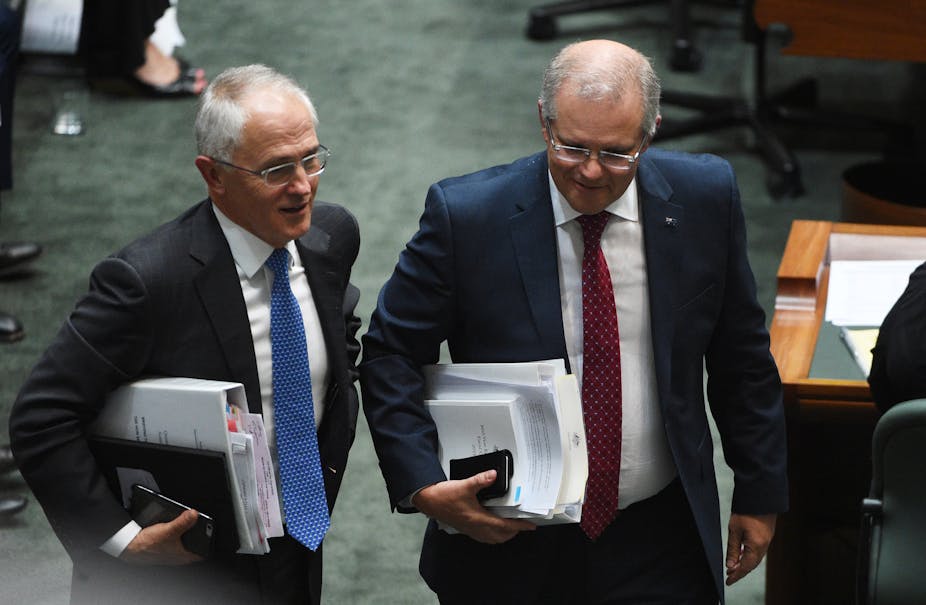If the government eventually decides against embracing a 15% GST, we might look back and conclude that the mortal blow was delivered this week.
The option is not dead at the moment but it is seriously ailing, some say on life support. Treasurer Scott Morrison, its champion in the government, has been forced to retreat from what has been his little-disguised public advocacy.
Morrison had a bad first week of the new parliamentary year, as the idea of a possible GST increase came in for a barrage of negativity.
Treasury modelling indicated a reform package centred on a GST rise and income tax cuts would not, after the hefty compensation bill, deliver a sufficient economic dividend to be worth the political price.
And Coalition backbenchers started to voice concern.
Victorian Liberal Russell Broadbent said no case had been made so far for a 50% increase in the GST. Given Broadbent lost his seat in each of the two GST elections, 1993 and 1998, his feel for the voters is respected and he is a lightning rod for wider backbench nerves.
Nationals senator Matt Canavan heaped ridicule on the idea. The GST “can do everything, apparently” – a kind of thermomix of policy. “It can bake, it can make soup, it can improve your love life.”
The Nationals aren’t keen on a GST hike because they have some of the poorest electorates where, despite compensation, the policy would go down particularly badly.
Deputy Nationals leader Barnaby Joyce went out with “a key message”. “There is no change to the GST. There is no even concrete plan of something to consider in regards to changes to the GST. This is a discussion and everybody has got terribly excited because we’re having a discussion.”
To add to Morrison’s discomfort Labor in parliament, and the media outside it, jumped on a newspaper report that fear about a GST increase “is greatest among MPs in marginal seats, referred to as ‘bedwetters’”. In the House the opposition confronted Morrison with a quote from last year when he described leadership rumblings as “a bit of political bedwetting by some”.
Morrison likes a colourful image. Broadbent and others don’t like being compared to infants.
Morrison, who had sounded gung ho on Monday, relishing the prospect of a hard tax fight, by Thursday had been brought back to the field, emphasising that no decisions had been made.
During Thursday’s Question Time, Malcolm Turnbull directed that Broadbent be given a “dorothy dixer” to ask. Turnbull wanted to set out the fundamentals of the tax debate, in a message to his backbench and the community.
Any changes must drive growth and jobs and be fair, Turnbull said. And “the complexity associated with them has to be justified in terms of a productivity output”.
Giving the question to the MP who had sounded a much-publicised note of electoral reality was a slapdown to Morrison.
Morrison’s options are to stand his ground internally and try to persuade Turnbull and other cabinet colleagues, or to go with the flow if that is against a radical (as distinct from a modest) tax package.
If he doesn’t fight, he will be condemned as weak by those in business and sections of the media who have been pressing for large scale reform. He has already cast himself as the macho man who wants to make a difference. But to fight and then lose, overruled by the prime minister, would be humiliating.
Morrison also has the issue of his relationship with Turnbull. According to one Liberal source, there is mutual distrust. “What’s happened is that when Morrison became treasurer, he was seen as having equal standing in the party room, as an alternative leader. Since then Turnbull has shown his dominance – in his performance in the media, the parliament, on policy, and with colleagues. It’s like night and day” between them.
If Morrison got his comeuppance from fractious backbenchers, Turnbull received a sharp put-down from the Senate.
Turnbull early in the week raised the possibility of a double dissolution, although his preference is to run full term. The context was the battle over the Coalition’s attempt to resurrect the Australian Building and Construction Commission (ABCC). The government said it wanted the legislation through by the time parliament rises on March 17 for its autumn recess.
The legislation, already rejected once, was gagged through the House of Representatives to speed it to the Senate. But the Senate then voted to send it to a committee – which is to report on March 15. Apart from Labor and the Greens, crossbenchers Glenn Lazarus, Dio Wang, John Madigan and Jacqui Lambie voted to thwart the government’s timetable. The mood on the crossbench – not keen on the legislation anyway – wasn’t improved by reports that the government is trying to get a deal on voting changes that would squeeze out micro players in future elections for the Senate.
Labor has its tail up at the end of this week. Its GST scare campaign is paying dividends, in tune with feeling in the electorate (Newspoll had 54% against a rise to 15%) and stoking trepidation on the Coalition backbench.
On a long view, however, the opposition could lose out of “wins” on the GST and the ABCC.
If the government decides a GST rise is too hard an ask for not enough benefit, Labor will be deprived of a potent election weapon. If the ABCC legislation is again defeated, the government will be able to depict Bill Shorten as soft on union thuggery.
In an election year, the swings and roundabouts can be complex.

